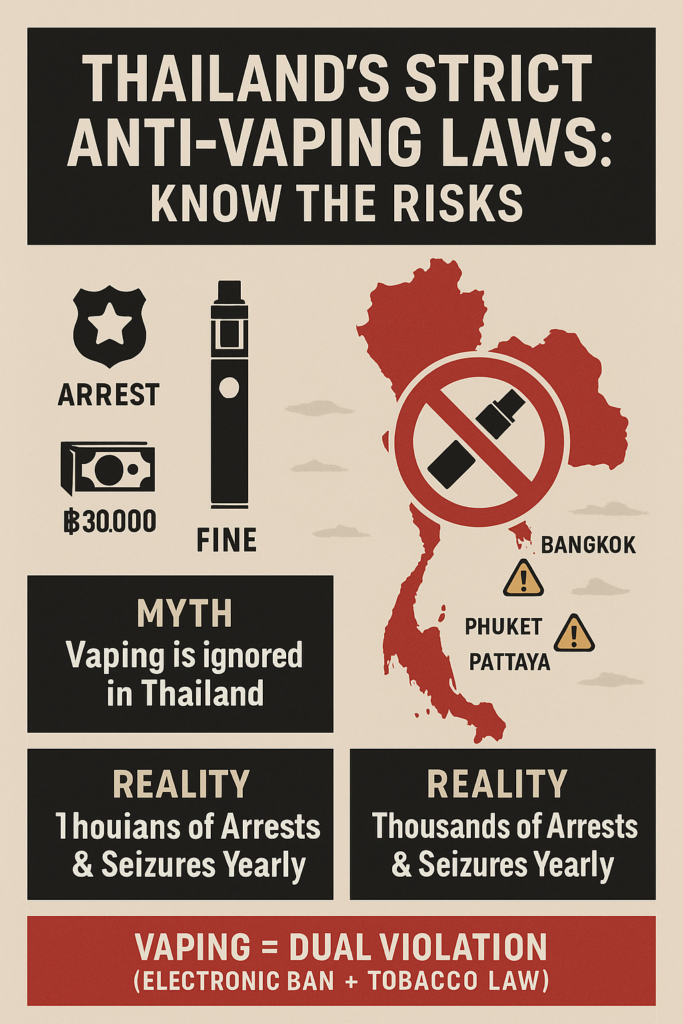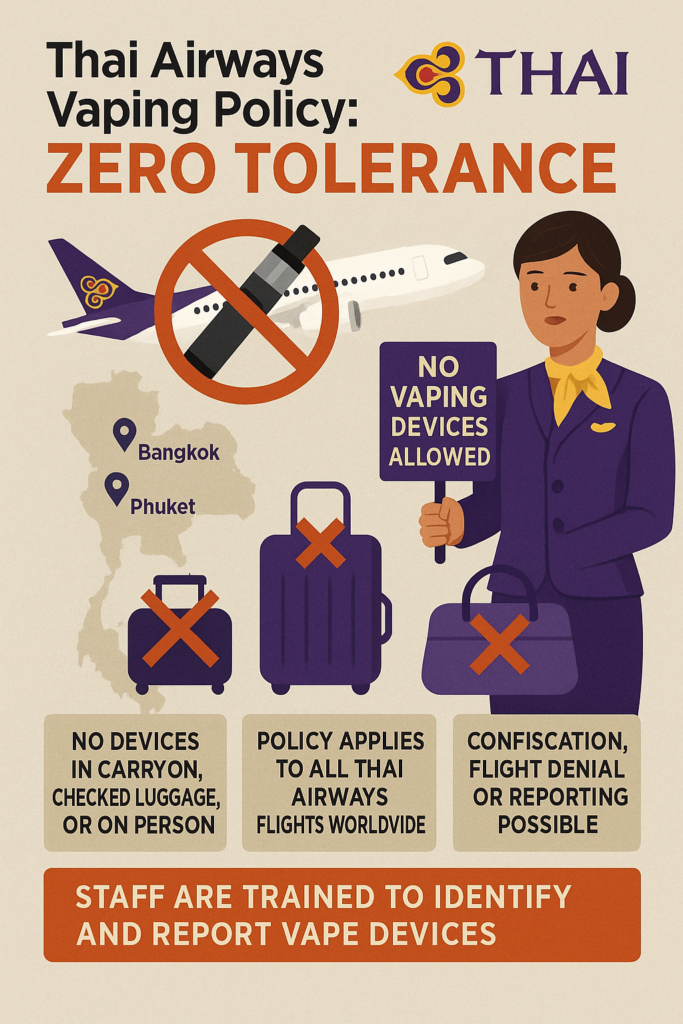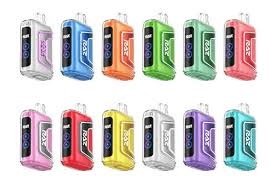Travelers face severe penalties when carrying vapes in Thailand, including potential imprisonment. Many tourists unknowingly break Thai law by bringing vaping devices, creating stressful situations when departing the country.
Flying with a vape from Thailand to another country is extremely risky and not recommended. Thailand has some of the world's strictest anti-vaping laws, with possession potentially resulting in fines up to 30,000 baht ($880) and imprisonment for up to 5 years. E-cigarettes and vaping products are completely banned in Thailand—illegal to import, export, sell, or possess. Airport authorities actively search for these devices during security screenings when departing Thailand, and many tourists have faced serious legal consequences for attempting to travel with vapes.
 "Security screening at Bangkok Suvarnabhumi Airport"
"Security screening at Bangkok Suvarnabhumi Airport"
I've witnessed firsthand the consequences of Thailand's strict vaping regulations during my frequent business trips to Southeast Asia. In 2019, I was at Bangkok's Suvarnabhumi Airport when a tourist ahead of me in the security line had his carry-on bag searched. The security officers discovered a small pod vape device, and despite the traveler's protests that he didn't know about the ban, he was immediately taken aside by airport police. This incident highlighted for me how seriously Thai authorities enforce these regulations, especially at border control points. The difference between Thailand's approach and neighboring countries like Malaysia or Vietnam is striking, creating a complex regulatory landscape that confuses many travelers. Let's explore the specific challenges of traveling with vaping products in Thailand and what you need to know to avoid serious legal complications.
Can I Fly Internationally with a Vape?
Many vapers traveling internationally worry about whether they can legally bring their devices on flights. Uncertainty about airline policies and destination country laws creates anxiety about potential confiscation or legal problems.
Generally, you can fly internationally with vapes in your carry-on luggage (never in checked baggage due to battery safety regulations) when traveling between countries where vaping is legal. However, Thailand is a significant exception, with complete prohibition of all vaping products. While most countries allow personal-use vaping devices through their borders, specific restrictions vary widely—from quantity limitations (UAE, Singapore) to nicotine concentration caps (EU, Australia) to flavor restrictions (Finland, Lithuania). Before traveling, research both your destination country's vaping regulations and your transit countries, as even connecting flights through countries like Thailand can result in confiscation or legal penalties if vape products are discovered during security rescreening.
 "X-ray machine showing vape device in carry-on"
"X-ray machine showing vape device in carry-on"
The international regulatory landscape for traveling with vaping products1 presents a complex patchwork of rules that can create significant challenges for vapers. Having traveled extensively throughout Asia and worked with distributors across multiple countries, I've gained substantial insight into the practical realities of these varying regulations and how they affect travelers.
The fundamental aviation safety regulations regarding vaping devices remain relatively consistent internationally. Lithium batteries, which power virtually all vaping devices, must be transported in carry-on luggage rather than checked baggage due to fire safety concerns. This requirement stems from international aviation safety standards rather than vaping-specific regulations, applying equally to other lithium-battery devices like laptops and smartphones. The restriction exists because lithium battery fires in cargo holds present significantly greater risks than in passenger cabins where they can be quickly addressed by flight attendants.
The quantity limitations for e-liquid2 create particular confusion for traveling vapers. Most countries limit liquid carry-ons to containers of 100ml or less, arranged in a clear, resealable quart-sized bag—the standard international liquid restriction for air travel. However, some countries implement vaping-specific liquid limits beyond these standard restrictions. The United Arab Emirates, for example, permits only two 10ml e-liquid bottles per traveler, regardless of whether larger bottles would fit within the standard liquid allowance. Singapore permits travelers to bring vaping devices through the country for transit purposes only, with strict quantity limitations suggesting personal use rather than commercial quantities.
Nicotine concentration restrictions present another layer of complexity, particularly when traveling to or through the European Union, the United Kingdom, or Australia. The EU and UK cap nicotine strength at 20mg/ml for all e-liquids, while Australia requires a prescription for nicotine-containing products. This creates situations where a product legally purchased in the United States (where 50mg/ml products are common) becomes technically illegal when entering these jurisdictions. Enforcement of these concentration limits during transit varies considerably, with some airports conducting little scrutiny while others implement more thorough checks.
Connecting flights create particularly challenging scenarios for traveling vapers. When making connections requiring rescreening, travelers become subject to the connecting country's regulations even if never leaving the airport. I've encountered this situation personally when connecting through Bangkok en route to Vietnam. Despite remaining in the international transit area, rescreening for the connecting flight meant potential exposure to Thai vaping prohibitions. This creates scenarios where a product perfectly legal in both origin and final destination becomes problematic during transit.
Documentation requirements vary significantly between jurisdictions. Australia's prescription requirement for nicotine products theoretically requires travelers to carry appropriate medical documentation. Travelers to the UAE may need to demonstrate that vaping products are for personal use rather than sale. These documentation expectations are rarely communicated clearly to travelers in advance, creating uncertainty about compliance requirements.
Enforcement intensity varies dramatically between countries and even between different entry points within the same country. Major international airports in vape-restrictive countries typically demonstrate more thorough screening and stricter enforcement than smaller regional entry points. This inconsistent enforcement creates false confidence among some frequent travelers who may have previously entered a restrictive country without detection only to face scrutiny on a subsequent trip.
Border control priorities significantly impact real-world enforcement. Countries with serious concerns about drug trafficking or terrorism typically dedicate less attention to vaping products than countries where vaping itself is considered a priority enforcement area. Thailand represents the most extreme example of prioritized vaping enforcement, with customs and immigration officials specifically trained to identify and confiscate vaping products.
For distributors like Tommy operating in Malaysia, understanding these international transportation complexities proves essential when sourcing products from multiple countries or handling warranty returns for products purchased abroad. The patchwork of regulations creates significant supply chain challenges and compliance requirements that directly impact customer service capabilities and inventory management.
Will Customs Take My Vape in Thailand?
Travelers often wonder about the actual enforcement level of Thailand's vaping ban, especially at airports. Conflicting anecdotes online create confusion about whether Thai customs actively searches for vapes or only enforces the ban when devices are used publicly.
Yes, Thai customs and airport security will almost certainly confiscate any vaping products they discover, and you may face serious legal penalties beyond simple confiscation. Thailand's vaping ban is actively enforced at all border entry points, with customs officials and airport security specifically trained to identify vaping devices, e-liquids, and accessories during baggage screening. Penalties for attempting to bring vapes through Thai customs range from hefty fines (typically 20,000-30,000 baht or $590-$880) to potential imprisonment for up to 5 years under Thailand's strict anti-vaping laws. Claiming ignorance of the law does not provide exemption from these penalties. Airport authorities implement particularly thorough screening procedures for travelers departing Thailand, specifically looking for tourists attempting to leave with vaping products purchased during their stay.
 "Customs inspection at Thai border control"
"Customs inspection at Thai border control"
The enforcement mechanisms for Thailand's vaping prohibitions involve sophisticated detection procedures and dedicated resources that demonstrate the government's serious commitment to this policy. Through multiple visits to Thailand and extensive conversations with local authorities and business contacts, I've developed detailed understanding of how these enforcement procedures operate in practice.
The legal framework underpinning Thailand's vaping ban involves multiple statutes creating a comprehensive prohibition. The primary regulation comes through the Consumer Protection Board Order No. 9/2558 (2015)3 which formally banned the import, sale, and possession of vaping products. This order was further reinforced by the Tobacco Products Control Act of 20174, which broadened definitions of prohibited tobacco products to explicitly include electronic cigarettes and similar devices. Additional legal authority derives from the Customs Act5, which provides border officials with extensive search and seizure powers for prohibited items.
Technical detection capabilities at Thai airports have evolved significantly since the initial 2015 ban. Current x-ray screening equipment at major Thai airports includes algorithmic detection specifically calibrated to identify the distinctive shapes and densities of vaping devices. This technology flags potential vaping products for secondary inspection, substantially increasing detection rates compared to earlier years when identification relied solely on human screener recognition. Security personnel receive specific training in identifying various vaping product types, including disposable devices, pod systems, and traditional mod setups—considerably more specialized knowledge than typical airport security in countries without vaping prohibitions.
Customs profiling practices at Thai border points incorporate several factors increasing scrutiny for potential vape carriers. Travelers from countries with high vaping adoption rates (particularly the United Kingdom, United States, and Malaysia) frequently receive additional attention. Demographics associated with higher vaping probabilities—particularly males aged 18-35—often experience more thorough luggage examinations. These profiling practices significantly increase detection probability for many Western tourists compared to other traveler demographics.
Penalties implementation demonstrates considerable discretion by individual enforcement officers, creating the inconsistent anecdotal reports that confuse many travelers. While the maximum penalties include potential imprisonment for up to 5 years, most tourist cases without aggravating factors (like large quantity possession suggesting distribution intent) typically result in fines rather than incarceration. However, this discretionary enforcement creates significant uncertainty, as outcomes depend heavily on individual officer decisions rather than standardized protocols.
The distinction between arrival and departure screening creates particular risks for uninformed tourists. Many travelers report relatively cursory vaping product searches upon entering Thailand, creating false confidence about enforcement levels. However, departure screening typically implements significantly more thorough vaping-specific detection procedures. This asymmetric enforcement creates scenarios where tourists bring devices into Thailand without detection, use them during their stay, then face penalties when attempting to depart with the same products.
The practical detention process for vaping violations involves procedures many Western tourists find particularly stressful. When vaping products are discovered, travelers are typically escorted to secondary screening areas where they may be detained for several hours during investigation and processing. Translation services for non-Thai speakers may be limited, creating communication challenges during this process. Access to consular services or legal representation typically occurs only after initial processing, leaving travelers temporarily isolated in an unfamiliar legal system.
Fine payment logistics present practical complications for departing travelers. When fines are assessed for vaping violations discovered during departure screening, payment must typically be completed before travel continuation is permitted. This creates potential missed flight scenarios if sufficient time isn't available before scheduled departure or if travelers lack immediate access to required payment amounts. Fine payment typically requires cash in Thai baht, with credit card payment options limited or unavailable at most enforcement locations.
For Malaysian distributors like Tommy supplying the regional market, understanding Thailand's strict enforcement creates important business implications. Products must be carefully routed to avoid Thai transit points, and warranty service requires specialized handling for Thai customers who may face legal risks when returning products for service or replacement. These complications create significant operational challenges for regional distribution businesses serving the Southeast Asian market.
Is Thailand Strict on Vapes?
Travelers researching Thailand's vaping regulations encounter contradictory information online—some sources emphasize severe penalties while others share stories of openly vaping without consequences. This inconsistency creates dangerous misconceptions about actual enforcement levels and risks.
Thailand maintains one of the world's strictest anti-vaping positions, with comprehensive prohibition on importation, exportation, sales, and possession of all vaping products. The ban is actively enforced, especially in tourist areas, with thousands of annual arrests and seizures. Penalties include fines up to 30,000 baht ($880) and potential imprisonment for up to 5 years. While enforcement may appear inconsistent in some areas, authorities regularly conduct targeted operations against vaping, particularly in tourist zones like Bangkok, Phuket, and Pattaya. Thailand has rejected the harm reduction approach adopted by neighboring countries like Malaysia and the Philippines, maintaining its hard-line stance despite international criticism. The Thai government classifies e-cigarettes as both banned electronic products and prohibited tobacco items, creating dual legal jeopardy for violators.
 "Thai police patrolling popular tourist destination"
"Thai police patrolling popular tourist destination"
Thailand's exceptional strictness regarding vaping products6 stems from a unique combination of regulatory philosophy, industry influences, and bureaucratic structures that collectively create one of the world's most hostile environments for e-cigarette users. My discussions with Thai regulatory officials and tobacco control advocates during industry conferences have provided valuable insights into the distinctive factors driving this policy approach.
The historical development of Thailand's anti-vaping position reveals important context for understanding its current strictness. Thailand's initial vaping ban emerged in 2014-2015 during a period of regulatory uncertainty globally, when many countries were still developing their approach to these novel products. While many nations subsequently adopted regulatory frameworks allowing controlled access, Thailand instead progressively strengthened its prohibitionist stance through additional legislation and enforcement resources. This divergence from regional trends demonstrates a deliberate policy choice rather than regulatory inertia.
The bureaucratic structure overseeing vaping regulation creates particularly strict enforcement mechanisms. Primary regulatory authority resides with Thailand's Consumer Protection Board, which classifies e-cigarettes as dangerous products prohibited under consumer safety regulations. Secondary authority comes from the Ministry of Public Health through the Tobacco Products Control Act. This dual regulatory framework creates overlapping enforcement jurisdictions—allowing multiple agencies to initiate actions against vaping products and users. This contrasts sharply with the single-agency oversight typical in most countries, significantly intensifying enforcement capabilities.
Statistical evidence confirms the active enforcement of Thailand's vaping prohibitions. According to data from Thailand's Customs Department, authorities seized over 248,000 vaping devices and related items between 2017 and 2020. Police records indicate approximately 3,400 arrests specifically for vaping-related offenses during the same period. These figures demonstrate substantial resource allocation toward enforcement rather than mere symbolic prohibition.
International diplomatic incidents highlight the seriousness of Thailand's approach. Several cases involving foreign nationals facing significant penalties for vaping have created diplomatic interventions, including a notable 2019 incident involving a British tourist detained for 12 days before diplomatic pressure secured release. These high-profile international cases demonstrate Thailand's willingness to risk diplomatic complications rather than relax enforcement for foreign visitors.
The policy rationale articulated by Thai authorities emphasizes particular concerns that differ from international consensus positions. Official statements from the Ministry of Public Health specifically cite concerns about youth initiation, chemical exposure uncertainties, and potential undermining of conventional tobacco control efforts. Notably absent from these rationales is the harm reduction perspective7 increasingly adopted internationally—the potential benefit for adult smokers transitioning from combustible cigarettes. This omission reflects a fundamentally different policy prioritization than neighboring countries like the Philippines that have explicitly incorporated harm reduction principles into their regulatory frameworks.
The influence of Thailand's tobacco industry structure cannot be overlooked when analyzing the country's strict anti-vaping stance. The Thailand Tobacco Monopoly (TTM)8, a state enterprise under the Ministry of Finance, controls the domestic cigarette market. This government ownership creates potential conflicts in regulatory policy, as vaping products represent direct competition to government revenue sources. While direct causation remains difficult to establish, this structural incentive alignment likely contributes to policy hostility toward disruptive nicotine alternatives.
Regional anomaly analysis further demonstrates Thailand's exceptional strictness. Neighboring countries including Malaysia, Vietnam, Indonesia, and the Philippines have all adopted significantly more permissive approaches despite sharing similar regional tobacco use patterns and public health challenges. This regional divergence highlights the distinctive nature of Thailand's policy choice rather than reflecting broader regional consensus about appropriate vaping regulation.
Public health community division within Thailand reveals evolving tensions in the current strict approach. While government policies maintain prohibitionist positioning, a growing contingent of Thai public health experts have begun advocating for harm reduction approaches aligned with international evidence. This internal expert disagreement suggests potential future policy reconsideration, though immediate regulatory changes appear unlikely given institutional momentum behind current approaches.
For distributors like Tommy operating in neighboring Malaysia, Thailand's strict policies create significant regional business complications. Product diversion risks, warranty service challenges for Thai customers, and complicated transit logistics all impact regional business operations. Understanding the deep-rooted nature of Thailand's strict approach helps regional businesses develop appropriate long-term strategies rather than anticipating imminent policy alignment with neighboring countries.
Are Vapes Allowed on Thai Airways?
Travelers booking with Thai Airways often remain uncertain about the airline's vaping policies, especially when compared to other carriers. Clear information about carrying devices, whether powered off or in checked baggage, proves difficult to find in official documentation.
No, vaping devices and e-cigarettes are not allowed on Thai Airways flights in any capacity—neither in carry-on luggage, checked baggage, nor on your person. Thai Airways implements one of the aviation industry's strictest anti-vaping policies, completely prohibiting these devices on all flights in alignment with Thailand's comprehensive national ban. This zero-tolerance policy exceeds the standard international aviation approach, which typically allows devices in carry-on luggage (but not checked baggage) provided they remain powered off. Thai Airways' policy applies to all flight segments, even those not departing from or arriving in Thailand. Attempting to bring vaping products aboard Thai Airways flights risks confiscation, potential flight denial, and possible reporting to authorities. The airline specifically trains staff to identify various vaping products during security and boarding processes.
 "Thai Airways staff at airport check-in desk"
"Thai Airways staff at airport check-in desk"
Thai Airways' exceptionally restrictive approach to vaping devices reflects both Thailand's national regulatory position and specific aviation safety philosophies that distinguish it from many international carriers. Having flown Thai Airways numerous times for business throughout Southeast Asia, I've gained detailed understanding of how their policies operate in practice and how they differ from industry standards.
The formal policy documentation covering Thai Airways' vaping restrictions appears in multiple regulatory instruments. The primary passenger notification comes through the airline's Dangerous Goods Policy1, which explicitly classifies "electronic cigarettes, personal vaporizers and electronic nicotine delivery systems" as prohibited items in both checked and carry-on luggage. This classification exceeds International Air Transport Association (IATA) Dangerous Goods Regulations, which typically allow these devices in carry-on luggage while prohibiting them in checked baggage due to lithium battery safety concerns. Thai Airways further reinforces this prohibition through their Conditions of Carriage2, which establishes contractual terms allowing denial of transport for passengers attempting to bring prohibited items aboard.
The enforcement mechanisms for Thai Airways' vaping prohibition involve multiple screening points with specific protocols. Initial enforcement occurs during check-in procedures, where agents receive training to inquire about vaping devices when processing passengers from high-prevalence markets like the United Kingdom, United States, and specific European countries. Secondary enforcement happens at security screening points, though these are typically operated by airport authorities rather than the airline itself. The final enforcement point occurs during boarding, where flight attendants maintain authority to deny boarding if prohibited items are discovered during this stage.
The operational implementation of these policies shows interesting variations across different route segments in the Thai Airways network. Routes connecting Thailand with other jurisdictions maintaining strict vaping regulations (particularly Singapore and Australia) demonstrate the most thorough enforcement procedures. Routes connecting Thailand with more vape-friendly jurisdictions (like Japan or many European destinations) still maintain prohibition but sometimes show less intensive screening specifically targeting these devices. This variation likely reflects practicality considerations regarding connecting passenger expectations rather than official policy differences between routes.
The policy justification provided by Thai Airways cites multiple rationales extending beyond simple alignment with national regulations. Safety documentation references concerns about potential lithium battery hazards3 specific to vaping devices, particularly the risk of unintentional activation leading to heating element operation during flight. Customer service representatives also cite cabin air quality concerns regarding potential residual vapor or odors affecting other passengers. These justifications position the policy as a safety and customer experience measure rather than purely regulatory compliance.
The distinction between Thai Airways policy and other Thai-registered carriers reveals interesting regulatory nuances. While all Thai-registered airlines prohibit active use of vaping products during flights (in line with both Thai law and international aviation standards), several smaller Thai carriers align with IATA standards regarding transport—allowing devices in carry-on luggage provided they remain powered off. This policy divergence suggests Thai Airways' approach represents corporate policy discretion rather than direct regulatory requirement applicable to all Thai carriers.
The international comparison with other flag carriers highlights Thai Airways' exceptional strictness. Even carriers from other jurisdictions with strict national vaping regulations (like Singapore Airlines) typically allow devices in carry-on baggage while prohibiting their use and their placement in checked luggage. Qatar Airways, Etihad, and Emirates—all operating from jurisdictions with significant vaping restrictions—also permit devices in carry-on luggage despite prohibiting use. This comparison demonstrates Thai Airways' position at the strictest end of the international spectrum regarding vaping device transport.
The practical implications for travelers create significant challenges, particularly for connecting passengers. Travelers using Thai Airways for specific flight segments within larger itineraries must make arrangements for vaping products that comply with the airline's policies—potentially shipping devices separately or temporarily abandoning them before Thai Airways flight segments. This creates particular complications for business travelers on extended trips who may have limited opportunity to acquire replacement devices at their final destination.
The enforcement consequences for policy violations vary based on discovery timing and specific circumstances. Devices discovered during pre-boarding screening typically result in requirements to dispose of the items before continuing the journey. Devices discovered after boarding but before departure may result in removal from the flight if passengers refuse to surrender the items. The most serious consequences typically involve devices discovered in checked baggage, as this violates both airline policy and fundamental aviation safety regulations regarding lithium batteries—potentially resulting in denied transport and reporting to regulatory authorities.
For business travelers like Tommy working across multiple Southeast Asian markets, understanding these specific airline policies proves essential when planning regional travel involving Thailand. The strict Thai Airways approach creates particular logistical challenges when coordinating multi-country business trips that include Thailand within larger regional itineraries. Planning alternative routing or different carriers for specific segments often becomes necessary to maintain business continuity while complying with these distinctive requirements.
Conclusion
Flying with a vape from Thailand to another country carries extreme legal risk due to Thailand's comprehensive prohibition on all vaping products. Authorities actively enforce these regulations at airports and border points, with penalties including substantial fines and potential imprisonment. Thai customs officials are specifically trained to detect vaping devices during security screening, with particularly thorough inspection of departing travelers. Thai Airways maintains one of the aviation industry's strictest anti-vaping policies, prohibiting devices in both carry-on and checked luggage. International travelers should thoroughly research vaping regulations for all countries on their itinerary, including transit points, as regulations vary dramatically between jurisdictions. For travelers in Thailand, the safest approach is complete compliance with local laws by not possessing or using vaping products during your visit.
My Role
My experience with Thailand's strict vaping regulations began during a manufacturing conference in Bangkok in 2018. As someone deeply involved in the vaping industry, I found myself in the unusual position of traveling without any sample products or devices—something I rarely do when visiting other markets. During the conference, I witnessed a fellow attendee from the UK being detained after hotel staff reported him for vaping in his room. The incident created significant complications for his business trip and required embassy involvement to resolve. This firsthand observation of enforcement severity fundamentally changed how I approach business travel to Thailand, implementing strict protocols for my team to ensure full compliance with local regulations regardless of personal opinions about the policy's merits. I now advise all industry colleagues to respect Thailand's legal position completely when traveling there, regardless of practices they might follow in other markets.
Tommy's experience navigating these regulations as a Malaysian distributor has created particular business challenges. His distribution territory includes customers throughout Southeast Asia, requiring careful logistics planning when servicing regional accounts. Thailand's strict approach creates a regulatory island within the region, requiring specialized procedures for warranty service and product returns from Thai customers who purchased products outside the country. We've worked together to develop compliance protocols for his business that respect Thailand's sovereign regulatory choices while maintaining service for customers throughout the broader region. This has included establishing alternative shipping routes that avoid Thai transit points and creating documentation systems that clearly establish legitimate business purposes for products moving throughout the region. These adaptations represent the practical reality of operating in a region with dramatically different regulatory approaches between neighboring countries.
-
Understanding the regulations for vaping products can help travelers avoid legal issues and ensure a smooth journey. ↩ ↩
-
Exploring e-liquid restrictions can help vapers prepare for their travels and comply with local laws. ↩ ↩
-
Understanding this order is crucial for grasping the legal basis of Thailand's vaping ban and its implications for travelers and businesses. ↩ ↩
-
This act is key to understanding the broader legal framework surrounding vaping products in Thailand, impacting both consumers and businesses. ↩
-
Exploring the Customs Act will provide insights into the enforcement mechanisms at borders, crucial for anyone traveling to or doing business in Thailand. ↩
-
Explore this link to understand the unique factors contributing to Thailand's stringent vaping laws and their implications for users. ↩
-
Discover the harm reduction approach and its significance in the global vaping debate, contrasting with Thailand's current stance. ↩
-
Learn about the TTM's role in shaping Thailand's vaping policies and its impact on public health and competition. ↩






